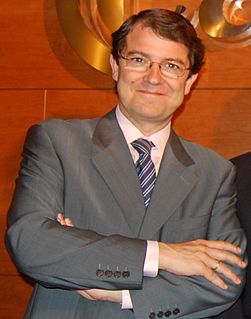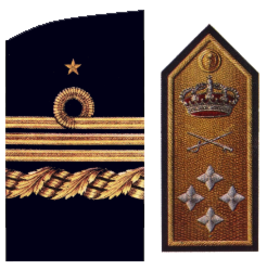
The "Marcha Real" is the national anthem of Spain. It is one of only four national anthems in the world that has no official lyrics.

The President of the Community of Madrid is the highest-ranking officer of the Autonomous Community of Madrid and the head of the Executive Branch. The office is currently held by Isabel Díaz Ayuso of the People's Party.

Cara al Sol is the anthem of the Falange Española de las JONS. The lyrics were written in December 1935 and are usually credited to the leader of the Falange, José Antonio Primo de Rivera. The music was composed by Juan Tellería and Juan R. Buendia.

Marcha de Oriamendi, is the anthem of the Carlist movement. The name of the anthem stems from the Battle of Oriamendi which took place in 1837 during the First Carlist War.
José María Aznar formed the Aznar government on 6 May 1996 after being nominated by King Juan Carlos I to form a government as a result of the People's Party's victory at the 1996 general election. Aznar was nominated again after the 2000 general election to form a new cabinet for a second term in office.
Felipe González formed the González government on 3 December 1982 after being nominated by King Juan Carlos I to form a government as a result of the Spanish Socialist Workers' Party's victory at the 1982 general election. González was nominated again after the 1986, 1989 and 1993 general elections to form new cabinets for a second, third and fourth terms in office.

The President of the Valencian Government is the head of government of the Spanish autonomous community of Valencia. The President is chosen by the Valencian parliament, the Corts Valencianes.

The President of the Regional Government of Andalusia or simply the President of Andalusia, is the first minister of the devolved government of the Spanish autonomous community of Andalusia. The Presidency is one of the three branches of the Regional Government of Andalusia (Junta de Andalucía), the institution whereby the government of the community is organized. The other two branches of are the Parliament of Andalusia and the Council of Government.

The President of the Junta of Castile and León, is the executive head of government of the Spanish autonomous community of Castile and León. The President is the head of the Junta of Castile and León, or regional government.
José Luis Rodríguez Zapatero formed the Zapatero government on 18 April 2004 after being nominated by King Juan Carlos I to form a government as a result of the Spanish Socialist Workers' Party's victory at the 2004 general election. Zapatero was nominated again after the 2008 general election to form a new cabinet for a second term in office.
Mariano Rajoy formed the Rajoy government on 22 December 2011 after being nominated by King Juan Carlos I to form a government as a result of the People's Party's victory at the 2011 general election. Rajoy was nominated by King Felipe VI after the 2016 general election to form a new cabinet for a second term in office.

Leopoldo Calvo-Sotelo formed the Calvo-Sotelo government on 27 February 1981 after being nominated by King Juan Carlos I to form a government as a result of Adolfo Suárez's resignation as Prime Minister of Spain on 29 January 1981.

The Chief of Staff of the Navy or Admiral Chief of Staff of the Navy (AJEMA) is the highest-ranking military officer of the Spanish Navy that under the authority of the Defence Minister exercises command over the naval branch, and as such is the principal military advisor to the Chief of the Defence Staff, the Minister of Defence, the Secretary of State for Defence, the Under Secretary of Defence and the National Defence Council.

The Chief of Staff of the Air Force (JEMA) is a four-star general that under the authority of the defence minister exercises command over the Spanish Air Force, and as such is the principal military advisor to the Chief of the Defence Staff, the Minister of Defence, the Secretary of State for Defence and the Under Secretary of Defence. It's also a member of the Council of Chiefs of Staff and a military advisor to the National Defence Council.
Pedro Sánchez formed the Sánchez government on 7 June 2018 as a result of the success of a motion of no confidence against Mariano Rajoy on 1 June. Sánchez was nominated again after the 2019 general election to form a new cabinet for a second term in office.
General of the Army(Spanish: General de Ejército) also called Army General, is a four-star general officer and the second highest possible rank in the Spanish Army. A General of the Army ranks immediately above a Lieutenant general and is equivalent to a Admiral General and a General of the Air. There is not equivalent in the Civil Guard or in the Spanish Navy Marines.
General of the Air(Spanish: General del Aire) also called Air General, is a four-star general officer and the second highest possible rank in the Spanish Air Force. A General of the Air ranks immediately above a Lieutenant general and is equivalent to a General of the Army and a Admiral General. There is not equivalent in the Civil Guard or in the Spanish Navy Marines.

Admiral General(Spanish: Almirante General) also called General Admiral, is a four-star general officer and the second highest possible rank in the Spanish Navy. An Admiral General ranks immediately above a Admiral and is equivalent to a General of the Army and a General of the Air. There is not equivalent in the Civil Guard or in the Spanish Navy Marines.












